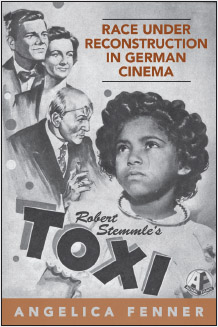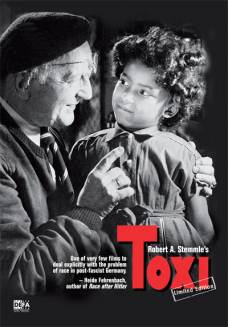 Released in June 2011, the monograph Race under Reconstruction in German Cinema by Professor Angelica Fenner is sparking interest on both sides of the Atlantic. Using as point of departure a pivotal postwar film, Toxi (Robert Stemmle, 1952), by one of the era’s most popular and prolific directors, the author undertakes a rich archaeology of postwar racial discourse in relation to other categories of difference, such as gender, class, and national identity. Toxi’s release coincided with the enrolment in West German schools of the first cohort of Afro-German children fathered by African-American occupation soldiers. Its didactic plot traces the ideological conflicts that arise among members of a patrician family when they encounter an Afro-German orphan needing adoption. Intended as a progressive intervention, the film draws attention to myths perpetuated in storybooks such as Heinrich Hoffmann’s Struwwelpeter, and broaches issues of integration at a time when the American civil rights movement was gaining momentum and encountering violent resistance. Fenner’s book is original in the way it explores intertextual crosscurrents with American popular culture and closes with an overview of Afro-German actors in contemporary German cinema.
Released in June 2011, the monograph Race under Reconstruction in German Cinema by Professor Angelica Fenner is sparking interest on both sides of the Atlantic. Using as point of departure a pivotal postwar film, Toxi (Robert Stemmle, 1952), by one of the era’s most popular and prolific directors, the author undertakes a rich archaeology of postwar racial discourse in relation to other categories of difference, such as gender, class, and national identity. Toxi’s release coincided with the enrolment in West German schools of the first cohort of Afro-German children fathered by African-American occupation soldiers. Its didactic plot traces the ideological conflicts that arise among members of a patrician family when they encounter an Afro-German orphan needing adoption. Intended as a progressive intervention, the film draws attention to myths perpetuated in storybooks such as Heinrich Hoffmann’s Struwwelpeter, and broaches issues of integration at a time when the American civil rights movement was gaining momentum and encountering violent resistance. Fenner’s book is original in the way it explores intertextual crosscurrents with American popular culture and closes with an overview of Afro-German actors in contemporary German cinema.
 Previously available only in German film archives, Toxi can now be purchased on DVD. Years ago, Fenner sought to convince the earlier copyright owner, Kirchmedia, to commercially release the film. The company, however, was already negotiating its sale along with a cluster of films to Kino International; she soon discovered that distributors like Kino often stockpile unreleased films for years, letting them accrue further value while focusing on more lucrative contemporary and ‘classic’ releases. However, in a fortuitous turn of events, as Fenner was surrendering her manuscript's final copy to the University of Toronto Press, the DEFA Film Library at the University of Massachusetts was emerging from authoring a series of East German DVDs. The Library’s Director, Professor Barton Byg and Production Manager Hiltrud Schulz were ideally poised to secure the North American licensing rights for Toxi. Thanks to Schulz’s diplomatic skills and perseverance, the film is now
publicly available and can be purchased directly from the Film Library website.
Previously available only in German film archives, Toxi can now be purchased on DVD. Years ago, Fenner sought to convince the earlier copyright owner, Kirchmedia, to commercially release the film. The company, however, was already negotiating its sale along with a cluster of films to Kino International; she soon discovered that distributors like Kino often stockpile unreleased films for years, letting them accrue further value while focusing on more lucrative contemporary and ‘classic’ releases. However, in a fortuitous turn of events, as Fenner was surrendering her manuscript's final copy to the University of Toronto Press, the DEFA Film Library at the University of Massachusetts was emerging from authoring a series of East German DVDs. The Library’s Director, Professor Barton Byg and Production Manager Hiltrud Schulz were ideally poised to secure the North American licensing rights for Toxi. Thanks to Schulz’s diplomatic skills and perseverance, the film is now
publicly available and can be purchased directly from the Film Library website.
When Schulz approached Fenner about providing a DVD extra in form of a video- or audio-commentary, her first impulse was to work within a dialogical structure. She turned to colleague and fellow scholar of German cinema and Critical Race Theory, Professor Tobias Nagl at The University of Western Ontario, where media technician Alyssa Evetts of the Film Studies Department ably recorded and mixed their commentary in the Film Department’s sound booth. Fenner had to quickly master the challenges of drafting a commentary to match Toxi’s rapidfire dialogue and condensed plot. This necessitated first authoring observations into a dialogical structure, then incrementally replaying seconds of the film while reading aloud portions of the script, and trimming as needed until the commentary synchronized with the unfolding screen action and was ready for rehearsal in the sound booth. She maintains it was ultimately very rewarding to explore “new avenues of knowledge production and dissemination beyond the
scholarly article or book.”
Book publishing, Fenner observes, has also been transformed by the Internet. Readers are more inclined to take up direct email contact with an author. She received a message from a theatre director who picked up a copy of Race Under Reconstruction in a Berlin bookstore and now intends to purchase the film he hasn’t viewed since childhood; she has also heard from scholars in the United States, and more locally from a graduate student at U of T working on a historiography of race in the History Department. She welcomes further contact from readers, and is developing a blog for her book at the University of Toronto Press website.

|